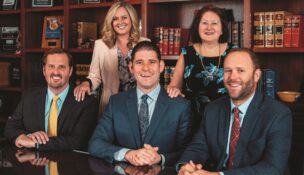How to become a big-picture systems thinker


How to become a big-picture systems thinker
To create a clear strategic vision and to see it through to completion, you need an unobstructed—and enterprise-wide—view of the management road ahead.
“Washington University’s Executive MBA program prepares you for business without blind spots,” says Meg Shuff, assistant dean of Executive MBA admissions. “You become a systems thinker—the connective tissue of any enterprise—with the courage to tear down organizational silos. You also are taught to change the competition game, which is a lot more powerful than simply winning it.”
WashU’s Olin Business School founded the 20-month program more than three decades ago. Over the years, the university has expanded its EMBA campuses from St. Louis to Kansas City, Denver, Shanghai, and Mumbai. Olin opened the Denver campus in 2013.
Program overview
The program kicks off in St. Louis with GO! Week, which introduces you to your EMBA course work, classmates, faculty, and professional development. Denver-campus students go back home for core courses that provide an integrated overview of functional areas.
You’re placed in carefully curated teams of professionals with diverse, but complementary, backgrounds and skills. EMBA students say these teams become learning laboratories as well as second families. Team assessments and coaching hone your leadership ability, enabling you to bring stakeholders together in more-relevant and innovative ways.
Learning by doing is woven into every aspect of the curriculum. EMBA courses and residencies boost your 360-degree thinking, creative-thinking, and analytical problem-solving skills. These skills help you transition from an effective manager to a successful executive. Equally important, you acquire a model of leadership you can take anywhere.
The Business of Policy: DC Immersion—part of WashU’s one-of-a-kind partnership with the prestigious Brookings Institution—allows you to leverage the people, processes, and politics behind U.S. government legislation, regulations, and compliance. During your four days in the nation’s capital, you rub elbows with government decision makers. You also talk, face-to-face, with legislators who vote on laws, administrators who set the domestic agenda, and power brokers who influence policy behind the scenes.
Year two takes you back to St. Louis for the weeklong Leadership Residency and for another program hallmark: its integrated, theme-based courses on Growth, Global Markets, and Innovation and Entrepreneurship. Working in teams, you and your classmates develop a new-venture idea and business plan. You also travel to Beijing and Shanghai to explore the intersection of business and government in China and to put yourself in the driver’s seat of global business.
A capstone pitch competition requires you to synthesize program teachings and tools. The competition is judged by company executives, potential investors, and university faculty members.
Points of differentiation
Four program differentiators shape your EMBA experience. At WashU, you build relationships that matter; learn to see beyond what has always been; experience an immediate, ongoing ROI; and make the university’s reputation your reputation.
“I’m two months into the program, and my leadership team already is regarding me differently,” says Trista Pitre, director of Ball Corp.’s Americas Business Services Group. “The overlap among my core courses is rounding out my picture of business and making me a more-confident, well-balanced executive.
“Program faculty members are amazing. They’re open, interested, responsive individuals who always are willing to go the extra mile for their students.”
“WashU professors are genuinely excited about collaborative learning, and they take the time to connect with you—inside and outside of the classroom,” Shuff says.
“They also bring new business thinking, practices, and trends into the classroom. The faculty’s intellectual capital becomes your competitive edge.”
In addition, EMBA faculty, administrators, and staff emphasize that great businesses run on great relationships.
“Since I was admitted and enrolled in the program, personal and professional opportunities—new friendships, networks, and management resources—have been popping up left and right,” Pitre adds.
Program classes meet monthly for three-day sessions (except for the residencies). First-year courses are held at RubinBrown’s offices at 1900 16th St. in Denver.
Apply online at EMBAOlin.com.
(This sponsored content was provided by Washington University's Executive MBA program.)













